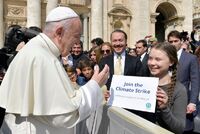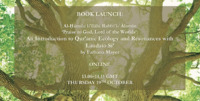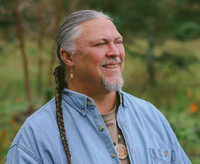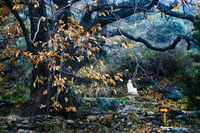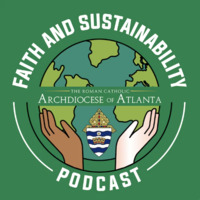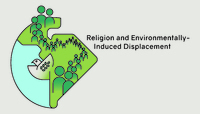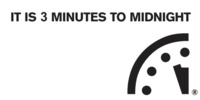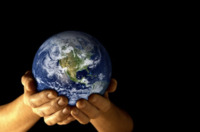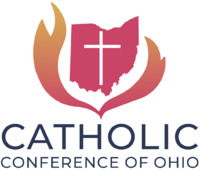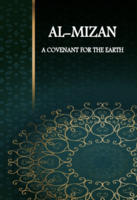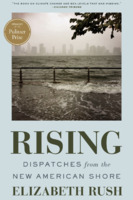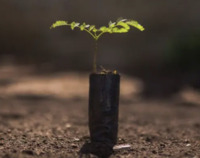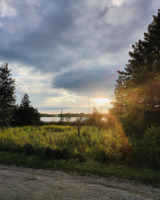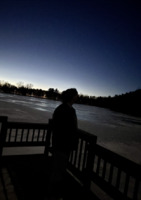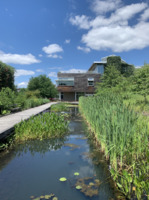Search
274 items
-
In 'Laudate Deum,' Pope Francis presents a compelling climate crisis apologia
"With a degree of urgency appropriate for the planetary catastrophe we face today, Pope Francis' latest apostolic exhortation, Laudate Deum, 'to all people of good will on the climate crisis,' builds on the important insights of his 2015 encyclical letter 'Laudato Si', On Care for our Common Home.' That the pope has explicitly described the current state of the climate as a 'crisis' could be viewed as affirming what climate activist Greta Thunberg said in her 2019 address at the World Economic Forum in Davos, Switzerland: 'Our house is on fire. I am here to say, our house is on fire.' " -
Book Launch: Qur’anic Ecology and Resonances with Laudato Si’
"The Laudato Si' Research Institute and the United Nations Environment Program (UNEP) Faith for Earth Initiative cordially invite you to attend this online book launch for An Introduction to Qur’anic Ecology and Resonances with Laudato Si’, by Farhana Mayer.
The launch will consist of an introduction to the text by Farhana Mayer, followed by responses from scholars and practitioners including Revd Prof. Joshtrom Kureethadam (Vatican Dicastery for Promoting Integral Human Development; Pontifical Salesian University), Prof. Ibrahim Özdemir (Uskudar University; member of drafting team for Al-Mizan: A Covenant for the Earth) and Dr. Iyad Abu Moghli (UNEP, Faith for Earth). There will be an opportunity for Q&A at the end.
This event will take place online [on October 19, 2023 from 1pm to 2:15 EST]. After you have registered, we will be in touch with the link to join." -
Presentation of the Apostolic Exhortation: "Laudate Deum"
This video contains discussion of Pope Francis' newly released Laudate Deum, as well as comments on how it connects with Laudato Si' and applies to future action. Environmental and religious activists, experts, and scholars speak on the issue as it relates to their field. The speakers explain possible ways to incorporate the information discussed in Laudate Deum and other knowledge surrounding climate change can be incorporated and developed into courses of action to address the climate crisis. -
Advent Simplicity Challenge
"This Advent, commit to simplicity. In a season that can mistakenly be focused on gifts and consumption, explore ways to live simply as we hopefully prepare for the coming of Jesus and the restoration of the earth. This year, we’ll be mixing in new daily challenges, as well as accompanying PDFs for folks who prefer not to use the interactive calendar." -
Decolonizing Thanksgiving
"As we head into the Thanksgiving holiday weekend in the United States, it’s great to think about all the things we can be grateful for. It is good to have a time to pause and reflect, to participate in the seasonality of gratitude for the year’s bountiful harvest, and to gather with family and friends. (We’ll ignore the über-consumerism of the day following Thanksgiving…)
Many of us probably know by now, however, that the story many of us learned in school about the first Thanksgiving is rather inaccurate at best, and racist and paternalistic in many ways, with a focus on the Manifest Destiny idea of the divine mandate for Europeans to conquer the “New World” in the name of Christ and country.
A few questions come to mind (at least my mind), for those of us with European-American roots, such as:
Should we even celebrate Thanksgiving, since it’s so tainted with colonialism?
What might it look like to “decolonize” our own understandings and our culture?
How can we do this work in a way that encourages our own folks to partner, rather than making them (our White brethren) feel further ostracized, but while also speaking real truth?
What can we do this Thanksgiving to begin to reconcile relationships damaged in the colonial era, both human to human and human to this land?" -
Prayers and Meditations for UNCOP28
"Our invitation to you and request of you on behalf of the ILC? We encourage people of all faiths to offer their prayers and meditations towards a beneficial UNCOP 28.
Our prayer and meditation around the world has helped the previous COP’s .This was the feedback we have received. The picture above is of Prayer and Meditation at COP26 in Glasgow. Not pictured are those who offered their spiritual practice at that time from many other places in the world. Our invitation is that we continue what we have begun with a renewed sincerity of commitment." -
MLK Day 2024
"ServeOhio Funds 19 Statewide Service Projects Taking Place in celebration of MLK Day
These grants support more than 1,300 volunteers engaging in local community service projects across fifteen Ohio cities
ServeOhio, the Governor-appointed commission on service and volunteerism, announces grant awards to support 19 local Martin Luther King Jr. Day of Service projects throughout January totaling more than $25,000. Much like Dr. King’s legacy, these grants will help nonprofits across the state improve their communities through service and volunteer activities. The grants will fund service projects in fifteen Ohio cities led by more than 1,300 volunteers.
Each project commits to bringing volunteers together to create or improve community assets or infrastructure and supports local community engagement and impact. Additionally, every project includes an education component based on Dr. King’s message of peace, unity, and service to create long-term, sustainable change.
ServeOhio awards these grants with support from the American Electric Power Foundation. Each grant totals between $250 - $1,500." -
Evolution of the Collective Unconscious
"The collective unconscious is made up of experiential knowledge, symbols, and imagery that humans are naturally born with (no tabula rasa) and are rooted in ancestral experience and shared by all persons in all cultures. After millennia of evolution, the current collective unconscious of humanity would seem to include human exceptionalism, patriarchal hegemony, short-terminism, delusions of grandeur, illusions of unending growth, and the idolatry of technology. As the planet becomes overloaded with industrial civilization, our collective mindset seems to be unwilling to think long-term and face the realities of ecological overshoot. It remains to be seen whether our collective mindset can evolve to voluntarily refocus human agency toward contraction of the human enterprise, simplification of lifestyles, and peaceful resolution of conflicts before it is too late to prevent a chaotic collapse of industrial civilization." -
The World on Fire: A Buddhist Response to the Environmental Crisis
The World on Fire: A Buddhist Response to the Environmental Crisis by Katie Javanaud explores how Buddhist teachings can inspire environmental activism. Javanaud examines key Buddhist sermons, such as the "Fire Sermon," which metaphorically portrays the world consumed by the flames of greed, hatred, and delusion, resonating deeply with contemporary environmental challenges.
Greed is identified as a driving force behind the environmental crisis, fueling overconsumption and disregard for ecological balance. Javanaud illustrates how Buddhist principles offer insights to counteract societal norms of materialism and promote mindful living.
The article addresses common objections to applying Buddhist teachings to environmentalism, providing valuable perspectives for those interested in integrating spirituality with environmental activism. This article serves as a concise introduction to Buddhist environmentalism, offering clarity on the compatibility of Buddhist values with ecological stewardship. -
Faith and Sustainability Podcast
The Faith and Sustainability podcast is a project created by the Archdiocese of Atlanta as part of their Laudato Si Initiative. Host Leonard Robinson is joined every week by influential members of different faith communities and environmental experts, where they discuss a wide range of topics like environmental justice, how to recycle, and climate change. The Faith and Sustainability podcast explores how faith and sustainability connect, and finding out how to better care for our planet. -
Religion and Environmentally-Induced Displacement
The goal of this project is to enhance people's understanding of the religious response to environmental displacement in Latin America. This database includes a list of past workshops and public events related to the subject as well as relevant documentaries on the topic. -
Why Conservative Christians Don’t Believe in Climate Change
"American Christians have become increasingly polarized on issues of climate change and environmental regulation. In recent years, mainline Protestant denominations and the Roman Catholic Church have made explicit declarations of support for global climate action. Prominent Southern Baptists and other evangelical Protestants, on the other hand, have issued statements that are strikingly similar to the talking points of secular climate skeptics, and have attempted to stamp out 'green' efforts within their own ranks. An analysis of resolutions and campaigns by evangelicals over the past 40 years shows that anti-environmentalism within conservative Christianity stems from fears that 'stewardship' of God's creation is drifting toward
neo-pagan nature worship, and from apocalyptic beliefs about 'end times' that make it pointless to worry about global warming. As the climate crisis deepens, the moral authority of Christian leaders and organizations may play a decisive role in swaying public policy toward (or away from) action to mitigate global warming." -
Taoist monks find new role as environmentalists
This article details the efforts of Taoist leaders in China to incorporate sustainability in Taoist temples and promote a culture of environmentalism. Since 2006, the Daoist Ecological Protection Network has gained the support of 120 temples who have converted to the use of solar panels and biofuels. Taoist monks noticed many people to be ignorant towards their environmental impact, living a life of hyper-materialism. Monks wanted to help educate society about the actions that can be taken to ameliorate environmental issues both at the temples and in daily life. This pursuit is driven by a fundamental belief in Taoism to live in harmony with nature, a value that could have large impacts on society if adopted. -
Threat of Global Warming/Climate Change - 2006 Statement of Conscience
This resource contains the climate statement of the Unitarian Universalist Association.
"Earth is our home. We are part of this world and its destiny is our own. Life on this planet will be gravely affected unless we embrace new practices, ethics, and values to guide our lives on a warming planet. As Unitarian Universalists, how can our faith inform our actions to remedy and mitigate global warming/climate change? We declare by this Statement of Conscience that we will not acquiesce to the ongoing degradation and destruction of life that human actions are leaving to our children and grandchildren. We as Unitarian Universalists are called to join with others to halt practices that fuel global warming/climate change, to instigate sustainable alternatives, and to mitigate the impending effects of global warming/climate change with just and ethical responses. As a people of faith, we commit to a renewed reverence for life and respect for the interdependent web of all existence." -
How Religion Intersects With Americans' View on the Environment
Through this study, they intended to obtain information about how religious Americans view climate change. This article explains the results of a survey. It shows how some religious Americans express little concern about climate change, and carry the belief that “there are much bigger problems in the world, that God is in control of the climate.” Additionally, some say that “they do not believe the climate is actually changing.” This survey also sheds light on other concerns religious Americans carry, such as fear surrounding the consequences of environmental regulations (fewer jobs, increased energy prices, and loss of individual freedoms).
Additionally, the survey extends to other religious affiliations as well as the religiously unaffiliated population. -
Turning Around Our Relationship with Earth is a Teshuvah Project
The author recounts an unsettling encounter with a utility worker who downplayed the environmental harm of her gas leak. From here, she explains the true negative impacts of methane emissions on both people and the climate, and encourages us to act in a way that "turns around our relationship with Earth". She connects this with the Jewish tradition of Teshuvah, the time in between Rosh Hashanah and Yom Kuppur meant for repentance. -
Care for Creation - Catholic Conference of Ohio
"The Catholic Bishops of Ohio invite you to study the issues related to the stewardship of God’s creation. Care for the environment is a fundamental principle within Catholic Social Teaching. We applaud efforts already underway in many Catholic homes and institutions that help conserve energy, protect the environment, and advance a greater understanding of faithful stewardship. We hope that Catholic families and institutions around the state will continue in such efforts."
This resource includes a statement calling to care for God's creation and contains information and links to several other resources related to religion and environmentalism. -
Al-Mizan: Covenant for the Earth
"The Covenant presents an Islamic outlook on the environment in a bid to strengthen local, regional, and international actions to combat the triple planetary crises defined by the United Nations as climate change, biodiversity loss and pollution. It is a global endeavour to engage Muslims from all levels of society in the development and adoption of this call...
Al-Mizan - A Covenant for the Earth is a restatement of the principles governing the protection of nature in a form that meets current challenges. It examines the ethics behind the social patterning of human existence and enquires into how they could be brought to life today working in harmony with the heartbeat of the natural world." -
Rising: Dispatches from the New American Shore
This resource contains a series of vignettes following Elizabeth Rush as she meets people all around American who have been affected in some way by global sea rising, as well as some of her own personal experiences. She gives voice to those otherwise not heard, and shares eye opening testimonials from those who experience the effects firsthand. -
Plant With Purpose
Plant With Purpose works to restore forests by planting trees in the most devastated and vulnerable parts of the world. They do this because they view the issues of global poverty and environmental damage as interconnected. -
Capturing the Essence of Sustainability at Halifax Public Garden
"Capturing the essence of sustainability at Halifax Public Garden. This picturesque view of the tranquil lake connects the myriad benefits of green spaces, from promoting social connections and mental well-being to enhancing physical health and fostering equity within our communities to improving water and air quality. Serving as a reminder of the crucial role green spaces play in fostering sustainable communities. By preserving and nurturing our natural environments, we not only enhance our quality of life but also safeguard the health of our planet for future generations. Let's continue to embrace and support sustainability efforts for a greener, more resilient world." Taken by Aklema Iryn. Submitted to the RESTORExchange Sustainability Photo Contest. -
Low Consumption Activities
"Low consumption activities are fun, walking in Schmeekle Nature Reserve in late January during golden hour". Taken by Elliot Fey. Submitted to the RESTORExchange Sustainability Photo Contest. -
Nature is Bright
"Nature is bright". Taken by Arun Thamarakshan Nair. Submitted to the RESTORExchange Sustainability Photo Contest. -
Walks in February
"Going for walks in February at Schmeekle Reserve is sustainability." Taken by Elliot Fey. Submitted to the RESTORExchange Sustainability Photo Contest. -
Center for Sustainable Landscapes
First Place Winner of the Sustainability Photo Contest
"This inspiring image shows the Center for Sustainable Landscapes (CSL) at PHIPPS Conservatory and Botanical Gardens. Not only does this picture show the beauty that nature provides for the built environment, but the building itself is a wonderful example of what success in sustainable development looks like. The CSL has achieved an abundance of green certifications including LEED Platinum, SITES Platinum, WELL Building Platinum, BREEAM Outstanding In-Use Building, etc. The building is completely net-zero and prioritizes sustainable practices such as renewable energy and rainwater collection. This photo perfectly exemplifies how sustainability can be represented in the urban landscape." Taken by Kelsey Frantz. Submitted to the RESTORExchange Sustainability Photo Contest.

